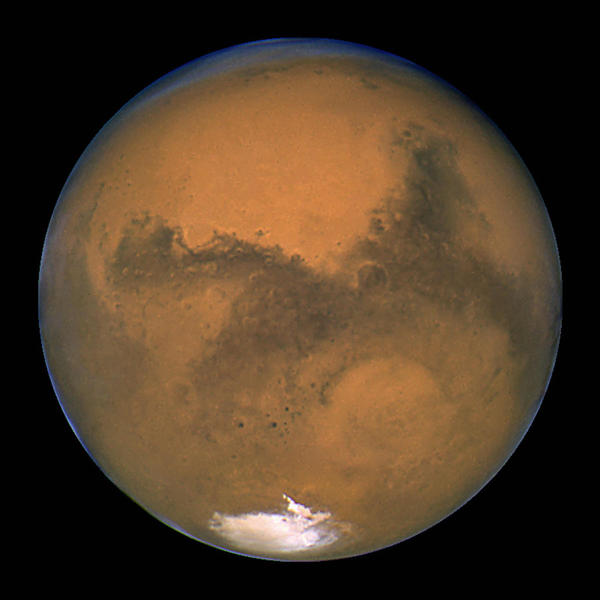Scientists think this ancient meteorite hints at life on Mars


A free daily email with the biggest news stories of the day – and the best features from TheWeek.com
You are now subscribed
Your newsletter sign-up was successful
A 1.3-billion-year-old Martian meteorite provides new evidence that there could be life on Mars.
A "cell-like" structure, found embedded in the Nakhla meteorite, once held water, researchers at the National Technical University of Athens and the University of Manchester found. The findings are published in the most recent issue of the journal Astrobiology.
The Nakhla meteorite hit Earth in 1911 in Egypt, but high-resolution imaging on the structure embedded in the rock has sparked a new wave of scientific interest. Though the structure may not technically be a cell, the fact that it once held water has scientists intrigued.
The Week
Escape your echo chamber. Get the facts behind the news, plus analysis from multiple perspectives.

Sign up for The Week's Free Newsletters
From our morning news briefing to a weekly Good News Newsletter, get the best of The Week delivered directly to your inbox.
From our morning news briefing to a weekly Good News Newsletter, get the best of The Week delivered directly to your inbox.
"In many ways it resembled a fossilized biological cell from Earth, but it was intriguing, because it was undoubtedly from Mars," Ian Lyon, a professor at the University of Manchester, said in a statement. "Our research found that it probably wasn't a cell but that it did once hold water, water that had been heated, probably as a result of an asteroid impact."
The meteorite has fueled speculation that there may be life on Mars — the fact that it once held water suggests that "Mars does provide all the conditions for life to have formed and evolved," according to Phys.org. If large asteroids hit Mars in the past, they could have produced hydrothermal fields capable of sustaining life. "Life as we know it, in the form of bacteria, for example, could be there, although we haven't found it yet," Lyon said in the statement. The researchers are now using new techniques to investigate other materials in the meteorite for further evidence of life.
A free daily email with the biggest news stories of the day – and the best features from TheWeek.com
Meghan DeMaria is a staff writer at TheWeek.com. She has previously worked for USA Today and Marie Claire.
-
 6 of the world’s most accessible destinations
6 of the world’s most accessible destinationsThe Week Recommends Experience all of Berlin, Singapore and Sydney
-
 How the FCC’s ‘equal time’ rule works
How the FCC’s ‘equal time’ rule worksIn the Spotlight The law is at the heart of the Colbert-CBS conflict
-
 What is the endgame in the DHS shutdown?
What is the endgame in the DHS shutdown?Today’s Big Question Democrats want to rein in ICE’s immigration crackdown
-
 Blue Origin launches Mars probes in NASA debut
Blue Origin launches Mars probes in NASA debutSpeed Read The New Glenn rocket is carrying small twin spacecraft toward Mars as part of NASA’s Escapade mission
-
 Dinosaurs were thriving before asteroid, study finds
Dinosaurs were thriving before asteroid, study findsSpeed Read The dinosaurs would not have gone extinct if not for the asteroid
-
 SpaceX breaks Starship losing streak in 10th test
SpaceX breaks Starship losing streak in 10th testspeed read The Starship rocket's test flight was largely successful, deploying eight dummy satellites during its hour in space
-
 Rabbits with 'horns' sighted across Colorado
Rabbits with 'horns' sighted across Coloradospeed read These creatures are infected with the 'mostly harmless' Shope papilloma virus
-
 Lithium shows promise in Alzheimer's study
Lithium shows promise in Alzheimer's studySpeed Read Potential new treatments could use small amounts of the common metal
-
 Scientists discover cause of massive sea star die-off
Scientists discover cause of massive sea star die-offSpeed Read A bacteria related to cholera has been found responsible for the deaths of more than 5 billion sea stars
-
 'Thriving' ecosystem found 30,000 feet undersea
'Thriving' ecosystem found 30,000 feet underseaSpeed Read Researchers discovered communities of creatures living in frigid, pitch-black waters under high pressure
-
 New York plans first nuclear plant in 36 years
New York plans first nuclear plant in 36 yearsSpeed Read The plant, to be constructed somewhere in upstate New York, will produce enough energy to power a million homes
